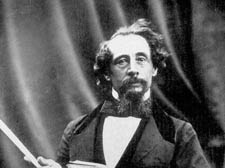|
|
 |
| |
 Charles Dickens giving a reading from his work Charles Dickens giving a reading from his work |
‘We studied Shakespeare – but we read Dickens’
Dan Carrier talks to Professor Michael Slater about his lifelong love affair with the once-neglected author
Charles Dickens: A Life Defined By Writing.
By Michael Slater. Yale £25.
FOR the only English writer who can rival Shakespeare for his posthumous influence and ongoing popularity, Charles Dickens was strangely ignored by educationists when Professor Michael Slater was a young man.
The Bloomsbury-based Birkbeck academic, who is an expert on the life and times of the author, has recently completed a 700-page biography of Dickens.
Yet the professor, who has slanted his telling of Dickens’ life story towards explaining the background to his most endearing and enduring texts, was never handed a copy of any of Dickens’ books as a school pupil, nor even as an Oxford English literature student.
Instead, Michael’s love affair with Dickens started when he was 11, and with a little piece of petty thievery. “I stole my sister’s books,” he recalls. “She had a set of Collins Classics and I began to read them.”
Paradoxically, it was the absence of Dickens from school and college course work that helped Professor Slater fall for the writer. “It meant it was never like doing school work,” he says. “We studied Shakespeare and Milton – but not Dickens.”
Professor Slater wonders if school teachers in the 1950s were unduly influenced by stuffy Oxbridge scholars who simply did not rate Dickens.
“They preferred George Eliot and Jane Austen,” he says. “Dickens was called an entertainer, nothing more. At Oxford the course ended in 1830. After that date, my tutors said Dickens wrote ‘books’, not real literature – things you could read in the bath.”
This had changed by the 1960s, and Dickens was seen as worthy of serious study. It coincided with Professor Slater writing a doctorate on Dickens’ Christmas stories, and gaining a post teaching English at Birkbeck College – a position he still holds.
Professor Slater’s book covers Dickens’ life chronologically: we follow him from his early years in Chatham to the childhood disaster of being employed in a blacking factory, and his father’s spell in a debtors prison. His loves are also covered, as is his interest in photography, the railways, and other groundbreaking Victorian inventions.
The book also cites how Dickens was shaped by his surroundings. It is no surprise, says Professor Slater, that poor Bob Cratchit in A Christmas Carol lives in a slum in Camden Town. When Dickens was a child and his family fell from financial grace, they ended up in a similar dreary house that Cratchett would live in when Dickens wrote the story nearly 40 years later.
But what Professor Slater’s book really does is lay bare one academic’s lifelong fascination with a premier storyteller, and charts how Dickens’ great novels sprung from his love of the cut and thrust of daily journalism.
“I thought how wonderful his journalism is, but how it is little known,” he says. “I wanted to write a biography that put the big novels in the context of his journalism. It was the starting point for Dickens. Such stories as Oliver Twist started out as journalism in the form of a series of sketches on the Poor Law.”
Professor Slater believes the ongoing relevance of Dickens can be traced to two factors – what Dickens himself called his “clutching eye”, and his use of language.
“Dickens could walk into a room and see everything,” he says. “He had a photographic memory. Also, he had such power with words. He created not just one or two but a whole crowd of unforgettable characters. They have entered our language, become part of the furniture of people’s minds. He had this amazing ability of combining the real and the fantastic in a such a way that you never ever forget his descriptions.”
|
 |
|
|
 |
 |
|
 |
|
 Charles Dickens giving a reading from his work
Charles Dickens giving a reading from his work
